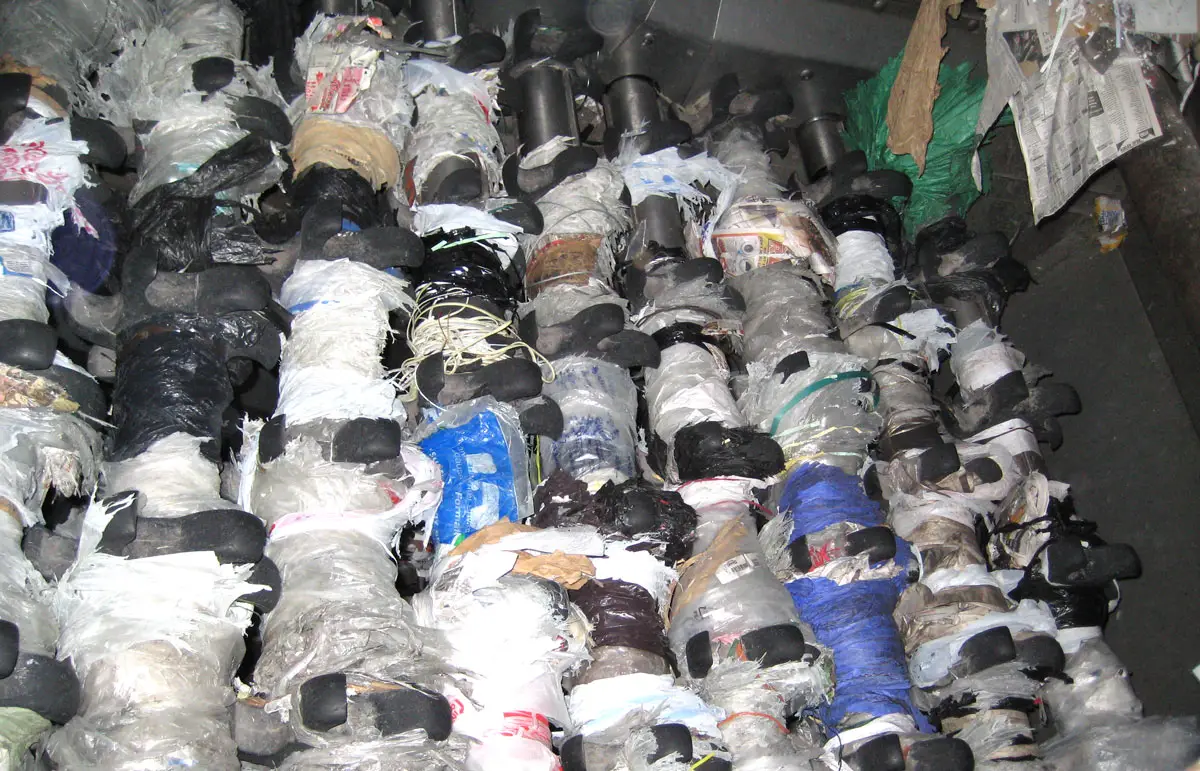There is a satisfying pop as I snap the can out of the six-pack holder. I unpack my beer into the fridge and am left with the thin plastic carrier. Now what? I sigh and add this one to the growing stack atop the refrigerator.
PakTech’s can holders are not recyclable in the traditional sense. You can’t just toss it in your bin for pick-up. The company, based out of Eugene, Oregon, uses 100% recycled plastic to make the holders and will take yours back but they need to be dropped off at a pick-up center.
Recently, a group of local hospitality businesses, including Slow Food Urban San Diego, County of San Diego, The Bountiful Bag, JuneShine Hard Kombucha, Pizza Port, Coronado Brewing, Nickel Brewing, Misadventure Vodka, and Thorn Brewing, has partnered to form the San Diego Brewcycling Collaborative.
The group’s aim is “to bring the San Diego craft beverage industry together through program support and education to sort, separate, and prepare recyclable items to be responsibly processed in order to make the industry more sustainable.”
I reached out to learn more from Tom Kiely, general manager at Thorn Brewing Co. and Steve Wiehe, a recycling specialist with the San Diego County Department of Public Works.
Cheers!: What and/or who was the motivator to get this program started?
Tom: Thorn had started a PakTech recycling program in 2018 which incentivized consumers to turn their used PakTechs into Thorn so that they could be re-used. It was a difficult program to run because it’s hard to stress-test PakTechs to make sure they’re strong enough to re-use, so we had to scrap the program.

Simultaneously, Coronado and Saint Archer [Brewing Companies} had reached out to us to inquire about our program, as they were looking to do something similar.
PakTech was willing to take them back from Coronado but only if they could send them a whole trailer load, which is not a practical solution for any single brewery. Then a few months later Vinepair interviewed Anna for an article about Paktech’s and it re-ignited our desire to do something about them.
So, I informed a group I volunteer with called Slow Food Urban San Diego of which I’m the Slow Beer Chair of my desire to develop a recycling project for these PakTechs.
Ariel Hamburger, my friend and co-board member who works with the county of San Diego, connected me with someone at the Public Works Department, who then put me in touch with Steve Weihe, who’s a county recycling specialist and is working on San Diego’s Zero Waste initiative.
I gave Steve a handful of PakTech’s and he ran an experiment with the MRF [Materials Recover Facility] at EDCO to see how well PakTech’s sort when they’re thrown into mixed recycling bins, like blue trash bins or bigger blue dumpsters. Turns out, not well. As in, only about 50% of them were sorted correctly. Their size, shape and color impact their ability to be accurately sorted.
So Steve connected me with a man named Ed Fitch who works for Cactus Recycling, a Recycling Company that purchases baled recyclables from material Users–like Thorn–and sells them back as raw materials to manufacturers, like PakTech.
Ed and Steve then took a tour of Thorn and identified a handful of materials, that could be recycled if properly separated and baled, two of which were grain bags and shrink wrap. I took the findings to my Slow Beer Committee Team (Darcy Shiber-Knowles, Sarah Shoffler, Eric Buchanan, Steph Parker) and we decided to pursue a project to offer recycling capabilities for Paktechs, shrink wrap & grain bags for sustainability minded-breweries.
Simultaneously, I had reached out to a bunch of San Diego breweries to see if they’d be interested in participating in a Paktech recycling program and got a fairly significant response. About 15 breweries totaling 250,000 bbl/yr worth of production.
In addition to the breweries, I was introduced to Fio & Romi Borkert, of The Bountiful Bag, who have been working on Brewery Waste upcycling for a few years and have a relationship with Misadventure Vodka. They were also interested in leading a San Diego Brewery Recycling program, similar to what I had pitched to my Slow Beer team, so we joined forces.

Then my friend Morgan Tenwick, Dir. of Quality at Juneshine, connected me with their Sustainability Lead (and now head-brewer) Luke Suttmiller, and he offered up Juneshine as the host site where we could have each brewery send their grain bags, shrink wrap & corrugated cardboard.
Though PackTech’s are what drove this movement, they weren’t an easy fit with Juneshine’s current operation, so we are using the other three materials to get us started and will ease Paktech’s into the program later).
We then all met as a big group and decided that we would begin by inviting a few breweries of varying sizes, so we could better understand how our program worked for each type of brewery, to participate in what we called “Phase 1.”
Phase 1 included a large-local brewery (Pizza Port), a small-local brewery (Thorn), a very small brewery (Nickel), as well as Juneshine. Pizza Port was the largest brewery with who we had the most contact. I run Thorn, and we needed a brewery from an unincorporated part of San Diego County for Steve to formally participate as a county employee.
Nickel Brewing owner Tom Nickel offered to be that brewery and Juneshine, as the host, offered to handle the logistics for the entire project. We have just recently included Saint Archer as a collaborator, Steve introduced his co-worker Natalia King to the group from the County of San Diego, my friend Sasha Escue (fundraising chair for Slow Food Urban San Diego) just joined, and Thorn’s very own Anna Brigham is helping as well!
The way Phase 1 works is that each brewery isolates their grain bags, shrink wrap and corrugated cardboard, then drives them to Juneshine. Juneshine combines all the breweries’ recycling with their own, bales them and ships it out to third-party recycling companies.
Phase 2 is set to begin on Jan. 1, 2022, we will be inviting breweries to join on Dec. 1, 2021, and use the month of December to onboard them. We hope to add PackTech’s to the list of collected items for Phase 2.
Cheers!: What kind of impact does the program anticipate making with the original program participants in terms of keeping materials out of the waste stream?
Steve: I think we’ll see a decrease in the amount of contamination in breweries’ recycling dumpsters. Materials like shrink wrap and grain bags can’t be recycled in a typical recycling dumpster.
If they are placed in a recycling dumpster, not only will they not be recycled (the MRF has no way to sort or handle these materials) they become tangled in the machinery (see attached photo) and cause the MRF to shut down until they can be cut out by hand.
Additionally, the breweries are or will be educated on what is accepted in the blue recycling dumpster, how to recycle right (keeping materials empty, dry and loose, not in a bag) and why keeping contamination out is important.
That being said, materials that aren’t allowed in recycling dumpsters/bins can still be recycled. These include the shrink wrap, plastic film and grain bags that the collaborative is working to source-separate and send directly to a third-party recycling company.
Through this process, breweries have started to take a look at what waste is remaining and if these materials are avoided, reduced, reused or recycled through source separation and consolidation through collaboration.
This program will also serve to educate brewery employees on proper recycling practices and one day, extend to customers that frequent these breweries.
Cheers!: Will consumers be able to make use of the program i.e. bring Paktech holders into drop-off locations?
Tom: Eventually, that is the plan, for us to set up drop-off locations for consumers to recycle their PackTechs. This has not yet begun, but feel free to email [email protected] if you’d like to get added to an update list on PackTech dropoff!
Cheers!: More environmentally friendly, cans or bottles? Why?
Steve: There have been quite a few articles written on this subject already. Both are infinitely recyclable and readily accepted throughout the county (i.e., curbside recycling bins at home, recycling dumpsters at work, CRV recycling locations).
An aluminum can goes from the recycle bin into a new can on the shelf in as little as 60 days. Most cans and bottles contain recycled content and are easily recycled. If you want to get into the weight of each material, energy used to produce/recycle them, that is a much longer conversation. In the end, if these materials (bottles and cans) are getting recycled into new products, it is a win no matter which one you use.
Follow @thornbeer on Instagram to see the latest brewery recycling updates and new beer releases like their “Best Canned Michelada on the planet.” Don’t forget! The Roast! West Coast coffee podcast has returned for a third season. All new episodes are released on the Coast News Podcast page every Tuesday and Thursday.



